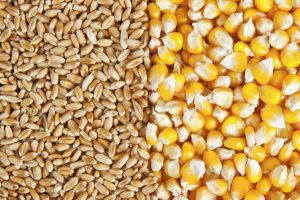
Sugar production in Ukraine as of September 14, 2020 amounted to 7,950 tonnes.
According to the report of the Ukrtsukor National Association of Sugar Producers, published on its website, as of this date, three sugar factories were operating in the country, which have processed 80,900 tonnes of sugar beets so far.
The sugar beet processing season in Ukraine started on September 5.
As reported, with reference to Ukrtsukor, sugar production in the country in 2020 is projected at the level of 1.2-1.3 million tonnes, which is 15% less than a year earlier.
It is expected that 33 sugar factories will operate this season, at the level of last year.

The analytical agency UkrAgroConsult predicts a wheat harvest of 25.9 million tonnes for 2020 with exports of 17.5 million tonnes and a corn harvest of 36 million tonnes with exports of 29 million tonnes.
“The assessment of export potential for wheat is quite consolidated – 17.5 million tonnes, this figure is fixed in a memorandum, an appendix to which has been recently signed. In any case, exports will be about 3 million tonnes lower than last year,” the UkrAgroConsult export for the grain market, Yelyzaveta Malyshko, said during the Black Sea Grain & Oil Trade 2020 international conference in Kyiv.
According to her, the start of the wheat export season was impressive, for example, from July 1 to August 28, some 4.16 million tonnes of wheat were exported, which is the highest figure for this period in the previous years.
“Now active export contributes to the fact that domestic prices for wheat in September are about $ 30 higher than last year and the demand remains. Expectations in this regard are quite optimistic. Forwards for December are now showing $ 225, but we cannot exclude autumn price deflection after the arrival of Canadian and then Australian wheat crop,” the expert said.
UkrAgroConsult’s estimate of the corn harvest for this year is 36 million tonnes.
The expert noted price expectations for corn are optimistic, however, a decrease in prices during the period of active harvesting cannot be ruled out.

Metinvest, the largest Ukrainian mining and metallurgical holding, has offered the buyback of its eurobonds maturing in 2021 and 2023 for a total amount of up to $ 290 million, in particular through the issue of new eurobonds.
The purpose of the offer is to proactively manage and extend the maturity of the issuer’s debt, and leverage favorable market conditions to refinance bonds to provide a more stable and long-term capital structure with a lower refinancing risk, the company said on the website of the Irish Stock Exchange.
Metinvest reminds that its 2021 eurobonds with a par value of $ 115.31 million and 2023 eurobonds with a par value of $ 504.52 million are in circulation. According to the proposal, the volume of redemption of 2023 eurobonds is limited by the condition to keep this issue in circulation in the amount of at least $ 300 million. In particular, it is indicated that if all 2021 eurobonds are submitted for redemption, the volume of redemption of 2023 eurobonds will amount to $ 164.25 million.
Metinvest also said that it had already received information from the holder of 2021 eurobonds for $ 80.8 million about the intention to make such a buyout. If this intention is confirmed, then for the general agreement on the operation of these securities, the participation of the holders of these bonds for about $ 5.7 million will be required.
According to the promulgated terms, 2021 eurobonds are redeemed at a price of 103% of the face value, 2023 eurobonds at 104.25% of the face value.
Redemption applications are accepted until September 28 inclusive. The earliest expected settlement date is October 1, the final one is October 16.

The Antonov State Enterprise (Kyiv) plans to enter the final stage in terms of testing, certifying and creating a new configuration of the An-178 medium cargo transport aircraft without Russian components, State Enterprise President Oleksandr Los has said in an interview with the Ekonomichna Pravda edition.
“Beginning from January 1, 2023, we are to expand the production of An-178 to 12 aircraft per year alongside developing financial framework, expanding markets, and processing state orders from Ukrainian companies,” he said.
“This is what we obtain from the potential marketing analysis that is needed by Ukrainian state authorities and meets the demands of our potential customers,” he added.
Los explained that due to the historically existing dependence on Russian components, the An-178 is the only immediately prepared serial production to date.
“Passenger An-158 aircraft is in order, since both models are related in terms of equipment. We are also starting to work on the aircraft under the working name of An-188,” the Antonov president said.
According to him, three An-148 and ten An-158 aircraft are currently in the Antonov serial production workshops at different stages of completion.
The president of the state enterprise said that for the time being COVID-19 pandemic complicates the work of Antonov, but plans are implemented as scheduled.
“As soon as I tried to increase the number of employees, the number of COVID cases immediately increased,” Los said, adding that the chief engineer of the enterprise had recovered from coronavirus.

The Verkhovna Rada intends to amend the Tax Code of Ukraine to support culture, tourism and creative industries.
Some 273 MPs voted in favor of bill No. 3851 at first reading.
According to an explanatory note to the bill, the document proposes to introduce tax mechanisms to provide state support to the spheres of culture, tourism and creative industries in order to prevent their stagnation, preserve and create new jobs.
The bill, in particular, proposes not to tax corporate profits, income of individuals, and a single income tax in the form of a cultural grant.
According to the bill, a cultural grant means “targeted assistance in the form of funds or property, which are provided on a free and irrevocable basis at the expense of the national and/or local budgets, international technical assistance for the implementation of a project or a program in the fields of culture, tourism and creative industries.
In addition, in terms of value added tax, it is proposed not to tax operations on import into the customs territory of Ukraine (import of goods) that are part of the national cinematic heritage.
It is also proposed not to tax certain operations for the supply of national films until January 1, 2025, and from January 1, 2023 to January 1, 2025, not to tax operations on the supply of services for the demonstration, distribution and screening of national films and foreign films that are dubbed, voiced in the state language on the territory of Ukraine, provided that such films are adapted, in accordance with the legislation, in the Ukrainian language version for persons with visual and hearing impairments.
BENEFITS, CREATIVE INDUSTRIES, CULTURE, SUPPORT, TAX, TOURISM

In January-August 2020 Ukraine reduced electricity export revenues by 18.3% (by $43.883 million) compared to the same period in 2019, to $196.325 million, in particular electricity was supplied at $7.66 million in August.
According to the State Customs Service, in the first eight months of this year electricity was exported to Hungary at $92.2 million, Poland for $56.586 million, Romania for $35.811 million and other countries for $11.728 million.
In addition, in January-August Ukraine imported electricity at the value of $111.340 million (at $1.336 million in August), including from Slovakia at $53.07 million, Hungary at $36.921 million, Belarus at $10.479 million and other countries at $10.87 million.
As reported, in 2019 Ukraine increased its electricity export revenue by 14.1% (by $46.825 million) compared to 2018, to $378.767 million, including $231.359 million for electricity export to Hungary, $84.584 million for export to Poland, $41.683 million for export to Moldova and $21.141 million for export to other countries.
In addition, in 2019 Ukraine electricity imports accounted for $121.401 million, including $43.115 million import value from Belarus, $36.336 million from Slovakia, $26.485 million from Hungary and $15.465 million from other countries.
In physical terms, in 2019 Ukraine’s electricity exports increased by 4.9% (by 303.6 million kWh) compared to 2018, to 6.469 billion kWh, and electricity imports amounted to 2.698 billion kWh.